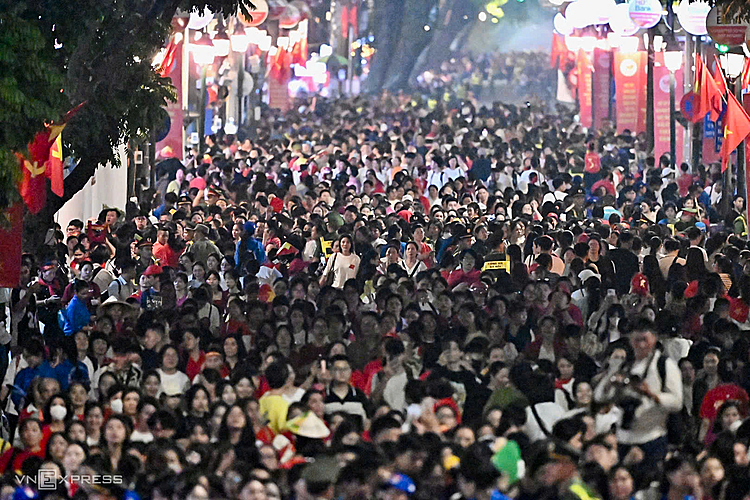Doctor Nguyen Huy Hoang, a member of the Vietnam Underwater and Hyperbaric Medicine Association, highlights the health risks associated with watching the September 2nd National Day A80 parade, including physical strain and environmental factors.
Traveling as early as 3-4 a.m. to secure a viewing spot disrupts sleep patterns and reduces stress tolerance. Prolonged standing and walking in crowds can cause muscle fatigue, poor circulation in the lower extremities, and fainting (syncope). The combination of sleep deprivation, heat, and prolonged standing significantly increases the risk of medical incidents.
Hanoi's early September climate, with temperatures ranging from 26-31°C and potentially reaching 35-36°C, coupled with high humidity, reduces the body's ability to cool down through sweating. This elevates the heat index, increasing the risk of heat cramps, heat exhaustion, and life-threatening heatstroke. Sudden downpours can also lead to chills and wet clothing, accelerating heat loss.
Crowded areas, such as the Hung Vuong - Nguyen Thai Hoc, Cua Nam, and Kim Ma - Lieu Giai intersections, pose a risk of injuries like falls, bruises, and sprains. High crowd density can also hinder medical personnel's access to those in need, increasing the risk of fatalities in cases of cardiac arrest, fainting, or heatstroke. Beyond physical risks, individuals may also experience psychological stress, anxiety, and panic in crowded situations.
 |
Trang Tien Street packed with people during the parade rehearsal on 27/8. Photo: *Thanh Tung* |
Doctor Hoang recommends carrying the following medical supplies:
Over-the-counter medications:
- Paracetamol: for pain and fever relief.
- Cold and flu medication: for use in cold, rainy weather.
- Non-drowsy antihistamines (Cetirizine, Loratadine).
- Loperamide: for acute diarrhea.
- Antacids: for heartburn, acid reflux, and indigestion.
- Nasal spray or eye drops: to alleviate dryness caused by dust and wind.
Prescription medications: Individuals with hypertension, diabetes, or asthma should bring an adequate supply of their prescribed medications and a copy of their prescription.
Essential first-aid supplies:
- Medical masks (at least 2-3): to protect against dust, vehicle emissions, and crowds (Hanoi often experiences high pollution levels).
- Wet wipes, toilet paper: for personal hygiene, especially for children.
- Hand sanitizer: for frequent hand disinfection to prevent the spread of illness in crowds.
- Sterile gauze pads: in various sizes, for cuts and scrapes.
- Medical tape (micropore/tape): to secure bandages, splints, or cotton balls.
- Adhesive bandages (plaster/band-aid): to prevent blisters and minor abrasions.
- Medical gauze/antibacterial wipes: for temporary wound cleaning.
- 70-75% isopropyl alcohol or alcohol swabs: for quick wound disinfection.
- Saline solution (0.9% sodium chloride): for eye washing, nasal irrigation, and wound cleaning.
- Antibiotic ointment: Neomycin, Mupirocin - to prevent infection.
- Sunscreen: SPF ≥30, waterproof, for protection against strong sunlight.
- Insect repellent gel or spray.
- Blunt-tipped medical scissors
To minimize environmental impact, wear a hat and sunglasses for sun protection. Carry a light raincoat or small umbrella for sudden rain, opting for compact versions. Bring bottled water (at least 1-2 liters per person) and snacks (bread, fruit, milk); a hand-held or mini battery-operated fan; sunscreen; and a cold pack for immediate cooling.
48 hours before the event, ensure adequate hydration and electrolyte intake, consume a dinner rich in complex carbohydrates, and have a light but energizing breakfast. Catch up on sleep for at least two nights prior, and familiarize yourself with the route, parking options, and viewing location.
While watching the parade, drink small sips of water frequently, eat light snacks every 2-3 hours, and rest in the shade whenever possible. Monitor for early warning signs like headaches, dizziness, and cramps.
Children are particularly vulnerable to dehydration and should wear wide-brimmed hats and carry identification. Elderly individuals are prone to falls and should avoid crowded areas, accompanied by a family member. Pregnant women or those with chronic illnesses should consult their doctor and prioritize well-ventilated areas, avoiding crowds.
If experiencing fatigue, dizziness, cold skin, or a weak, rapid pulse, move to a shaded area, elevate your legs, and apply a cold compress. For heatstroke symptoms (hot, dry skin, body temperature >40°C, confusion, or unconsciousness), immediately cool the person down (pour water, fan, apply cold packs), call emergency services, and do not give fluids if they are confused. If someone experiences hypoglycemia (tremors, sweating, rapid heartbeat, intense hunger), give them sugary food or drinks, followed by starchy foods. In emergencies, seek assistance from nearby police, security personnel, or volunteers for medical help.
Thuy Quynh












